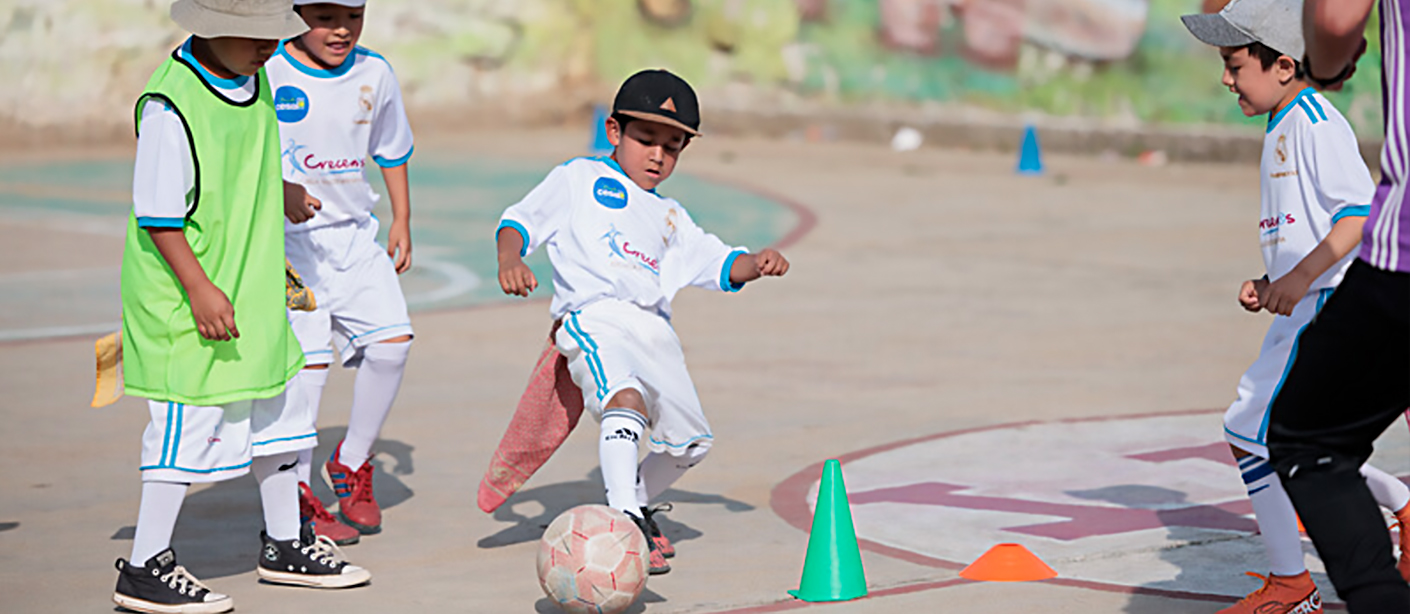Growing, active bodies have unique nutrient and energy needs. With proper nutrition and hydration, parents can help their children excel on the playing field and bounce back faster after the game.
A Full-Body Sport: The Physiology of Soccer
Soccer is a dynamic game, and it requires more than stamina alone. Powerful leg muscles — such as calves, hamstrings and quads — help your child kick, jump and run faster and farther, and strong glutes support a forceful kick. Hip flexors also help your child pivot quickly or come to a sudden stop before attempting a kick.
Above the waist, a strong core helps with balance and stability, while bicep, tricep and shoulder strength supports throw-ins. And because players need to size up their opponents, plan ahead and react quickly, soccer requires mental muscle, too.
Key Components of Sports Nutrition for Kids
Young soccer players need plenty of calories for energy and to support growth, but calories are only one part of the equation when it comes to sports nutrition.
Carbohydrates
First and foremost, active bodies need carbohydrates to provide glucose, the brain's and muscles' favorite fuel. There are currently no youth-specific guidelines for carbohydrate intake for soccer players, but research in the Journal of Science in Sport and Exercise concludes that many youth soccer players only consume roughly 2 grams of carbohydrates per pound of body weight each day. Kids have the same general daily carbohydrate recommendations as adults (despite their smaller size) due to the demands of growth. Therefore, based on recommendations for adult soccer players, researchers conclude this is likely inadequate to provide the fuel kids need to thrive on the field and recover after play.
So, aim for about 3.5 to 4.5 grams of carbs per pound of body weight each day. If your child weighs 50 pounds, this means they should consume between 175 and 225 grams of carbs daily. This goes for both boys and girls, though boys start to have greater macronutrient requirements than girls starting around age 8.
Protein
Active kids also need protein, which delivers tiny building blocks called amino acids that promote muscle growth and repair. Unlike carbohydrates, the body can't store protein. This means it's necessary to distribute protein between meals and snacks throughout the day. Generally speaking, 4- to 8-year-olds should get at least 19 grams of protein per day, while 9- to 13-year-olds should consume at least 34 grams daily. There's not a separate recommendation for active children, but some evidence suggests that physical activity increases protein requirements. So, make sure your child is getting at least the recommended daily amount.
Fat
Carbohydrates are the body’s primary fuel, but fat is an essential long-term energy source for active kids, too. Fat helps slow down digestion and keeps your child feeling satisfied for longer on the field. Fat also supports brain development and the absorption of vitamins A, D, E and K. As a general rule of thumb, your child's fat intake should make up roughly a third of their daily calories and be evenly distributed throughout the day, sourced from foods such as nuts, seeds, butter, avocados, cheese and oils.
How Hydration Fits Into Sports Nutrition
Sports nutrition isn't only about food. Your child also needs plenty of fluids to help regulate body temperature, cushion joints and support brain health. Yet kids can lose water quickly when they sweat it out on the field. To complicate matters, many children don't feel thirsty until they're already dehydrated.
In addition to hydrating before the game, the U.S. Soccer Federation recommends young players drink 5 to 9 ounces of fluid every 20 minutes during play or practice. While water is a great choice, an oral rehydration solution such as Pedialyte® also has electrolytes to help replace what's lost in sweat.
Your Child's Soccer Fueling Strategy
A nutritious breakfast, lunch or snack before the game can provide important nutrition. But to give your child what their body needs to thrive on and off the field, they need to fuel up before, during and after the game. Try these foods and beverages to help support your little athlete:
Before the Game
A light, well-balanced meal or snack including carbohydrates, protein and fat three to four hours before play is a great way to top off your kid's nutrient stores. For optimal hydration, serve it with plenty of fluids. According to the American Academy of Pediatrics, a good goal to minimize fluid loss during exercise is around 3 to 8 ounces of fluid every 20 minutes for 9- to 12-year-olds and an additional 5 to 10 fluid ounces of water or an electrolyte drink right before game time.
- Peanut butter and banana smoothie made with 1 cup vanilla yogurt, ½ cup milk, 1 ripe banana and 1 tablespoon peanut butter
- Nutty chocolate trail mix with whole grain cereal squares, chocolate-covered raisins and roasted almonds
- Graham crackers and a glass of chocolate milk
- Mini pitas with hummus and a drizzle of olive oil
At Halftime
Fruit is packed with quick energy from carbs. Plus, many fruits are over 80% water — including apples, watermelon, oranges and grapes — so it's a delicious way to replace fluids. For even more hydration, serve these halftime snacks with a bottle of cold water or a chilled electrolyte drink.
- Orange slices
- Fruit kebabs
- Frozen grapes
- Berries
- Squeezable pouches of applesauce
After the Game
Post-play, growing bodies need protein and carbohydrates to help repair and refuel spent muscles.
- Bean and cheese quesadilla
- Multigrain waffles with ricotta cheese and sliced strawberries
- Turkey and Swiss cheese on a mini bagel
- Greek yogurt with granola
- Scrambled eggs and a slice of ham on a whole-wheat English muffin
Sports nutrition for kids doesn't have to be complicated, but it takes a little time and forethought. If you're concerned that your young athlete isn't getting the nutrients they need, check in with your pediatrician for help filling in the gaps.
Article originally published July 31, 2023.




Social Share